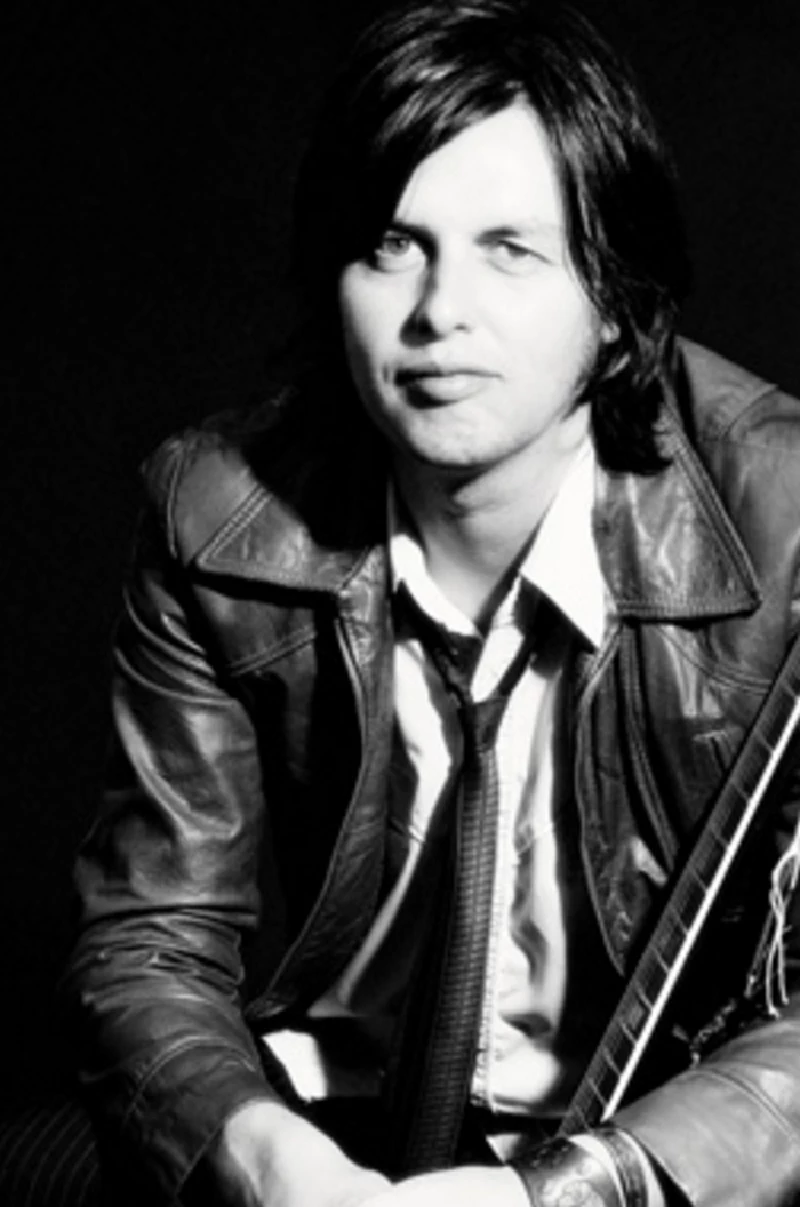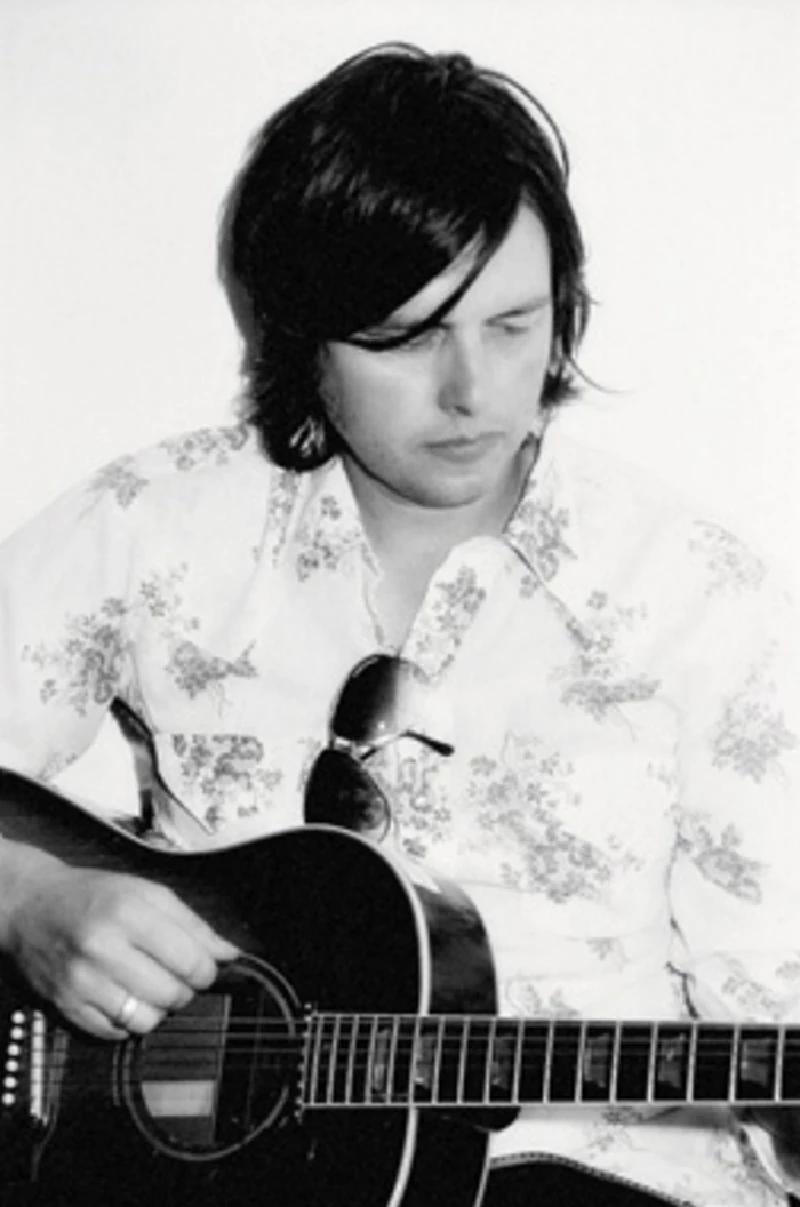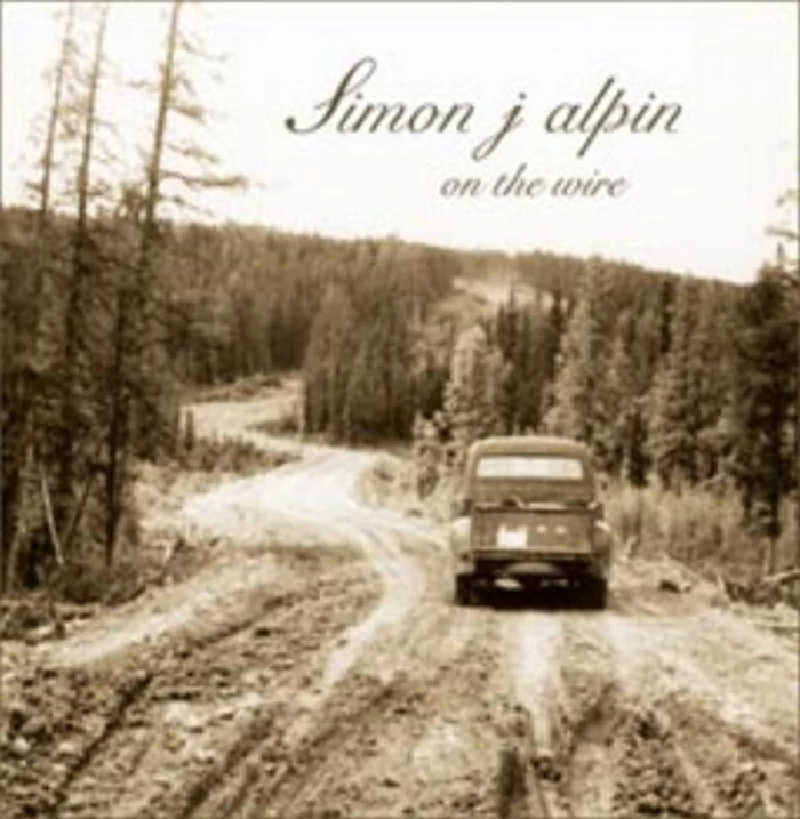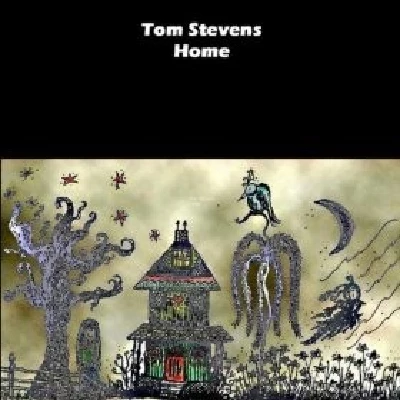Tom Stevens - Interview
by John Clarkson
published: 24 / 8 / 2007

intro
One of Britain's most prolific session musicians, Simon J. Alpin is also a producer and has worked with both the Willard Grant Conspiracy and Grand Drive. With Alpin's debut solo album, 'On the Wire' just out, John Clarkson speaks to him about the different strands of his career
Simon J. Alpin is one of Britain's most prolific session musicians. Best known as a guitarist, the Sunderland-raised Alpin, a multi-instrumentalist can also play the mandolin, banjo and pedal steel, and has worked with a long line of musical acts which include the Teenage Fanclub, Devendra Banhart, Badly Drawn Boy, Thalia Zedak, the Walkabouts' Chris Eckman, Deanna Varagona, Last Town Chorus, Brian Kennedy, Viarosa and Wendy James. In 200O he joined the Willard Grant Conspiracy shortly after they had released their fourth album, 'Everything's Fine', and played with them on their subsequent tour to promote it. He also worked as a co-producer and co-writer with their singer and front man Robert Fisher on their much acclaimed fifth album, 'Regard the End'. 2005 found him producing 'The Famous Mad Mile', the debut solo album of Danny George Wilson, the front man with Grand Drive, another group whom Alpin has toured and recorded extensively with. Alpin is also a songwriter and released his debut solo album, 'On the Wire' in July which, as well as Fisher, features appearances from among others Willard Grant Conspiracy violin player Josh Hillman, one-time Grand Drive keyboardist Seymour Martin, former Godfathers' guitar player Chris Burrows, singer-songwriter Jesse Klein and ex-Whiskeytown singer Caitlin Cary. A deceptively easy-on-the ear collection of breezy Americana tunes and soft ballads, it is lyrically hard-hitting and dark and tells of break-ups, dead friends and drunken benders. Pennyblackmusic spoke to Simon J. Alpin about the different strands of his career and 'On the Wire'. PB : You're probably best known as a session musician, but you've had your own publishing deal since you were 15. When and where did you first start playing music ? Were you very, very young ? SA : I first picked up the guitar when I was about seven and I played the same song for about five years, which was the Elvis song, 'Suspicious Minds' (Laughs). I used to go to a folk club in Sunderland. I met this old guy there who was a musician and I ended up getting a few lessons from him, so my one song became a few more songs and things escalated from there. PB : And when did you first start writing music ? SA : It was probably when I was around 14 or 15, the time just before I left school. They weren't particularly good songs, but I was picked up by Dave Stewart from the Eurythmics. I sent a tape in to him and he picked up on the songs. I was actually working with another singer at the time and we both moved to London. We were both young kids and she crumbled under the pressure of being away from home and ended up going back to Sunderland while I ended up staying on in London. PB : So really you made the decision to go into music as a full-time career fairly young then ? SA : Yeah, I had a lot of family influences. My cousins were the guitarist and bassist in Martin Stephenson and the Daintees. There were always instruments around when I was a kid, so it seemed like the cool thing to do (Laughs). PB : So it was in the blood ? SA : It was engrained into me from an early age. My Dad also plays. He is a great songwriter. He hasn't been discovered yet, but hopefully (Laughs). PB What about session work ? When did you first start doing that ? Was that when just came to London ? SA : Yeah, it was when I first came to London. I was very much thrown in at the deep end. I ended up in the studio with some of the top session guys. I was put in with Jon Bavin, who was the engineer on 'Sweet Dreams' and 'Be Yourself Tonight'. We did some stuff for Dave Stewart. Chucho Merchan from the Eurythmics played bass on a few tracks and Martin Chambers from the Pretenders did some stuff. It was quite a mad turnaround experience being this young kid thrown in from playing bars in Sunderland to being in a big goldfish type studio in London. I just had to bite my lip and go for it. It was quite daunting at first. I thought "Well if other people can do it, I can do it". Playing with drum machines I found initially very hard. I had always played with real drums in a band situation. If you work with people like Dave Stewart, it is all programmed music. You have got to be really on the ball to make it sound good. Otherwise it just sounds like amateur half hour. Dave had taken me under his wing and wanted me to write stuff for people like Darryl Hall. At that age I didn't really have any life experience about what these people were singing about. It has taken quite a lot of time for me to find my own voice and what I want to sing about and how I want to put it over. I am a big fan of people like Rickie Lee Jones, Dylan, Joni Mitchell, Little Feat and Steely Dan, early 70's music really. It always felt to me when I was working in that situation that a lot of feeling was lost when you used a drum machine. There was no movement between the musicians. That was why when we recorded ‘On the Wire’ we recorded it all at the same time and all in the same room. PB : ‘On the Wire’ was recorded over two days, wasn't it ? SA : Yeah, we initially went into record eleven or twelve songs for the record and we did that in the first day and they all sounded great. Every song on the record is first or second take. There are some backing vocals that I got Caitlin Cary from Whiskeytown and Jesse Klein, who is from New York and who guested on a few songs, to sing on which we overdubbed. There are some extra little bits of guitar as well, most of which was done on a laptop in hotel rooms or people's houses, extra little bits after the event. I recorded Robert Fisher from the Willard Grant Conspiracy’s vocal on the last track, ‘All Talk’, I think in a hotel in Spain straight on to a lap top and then I mixed it back in London. I didn't, however, go in and redo all the vocals or redo the guitars, and basically it is pretty much as we recorded it PB : Why did you decide to do that and record it live rather than use a lot of overdubs ? Was it because of financial constraints ? SA : Not really A lot of the music I like such as Van Morrison’s 'Into the Music’ and a lot of early Ry Cooder stuff such as 'Into the Purple Valley' and 'Across the Borderline' sounds like it has all been recorded together. Those records don't seem like overdub after overdub. I just feel with records like that they can get a bit one dimensional and you don't get the dynamic you do when you are playing with a band and you're all moving together and you rise and fall and together like you do at a gig. I think a lot of records actually miss that in their recording. You go and see a band and you're blown away by them and then when you listen to the record it doesn't translate. It sounds like somebody's been in there squashing the life out of everything. PB : ‘On the Wire’ was recorded quite a long time ago in 2004. Here we are three years later. Why has it taken quite so long for it to come out? SA : It is just because I have been really busy. The guy that engineered it originally, Nick Hunt, who has worked with The The and just about everybody under the sun, has been busy as well. I just wanted to make sure that we had got the mix right. It didn’t actually take that long. It probably took about seven days, but it was when we could both get together and find the time to sort it out and mix it. That was the reason why it took so long to get sorted. We were also looking around for the right deal. PB : It is coming out on Ravine Records. Is that your own label ? SA : It is a label run by myself and my management. We did get a few offers from indie labels, but they weren’t offering any money up front, so in the end I said “Well, if they’re not offering out any money upfront we might as well put it out ourselves.” That way we at least know how many copies we are selling, what the audience is and in which areas of the world we are selling records. PB : Are you the only act on that label at the moment ? SA : We have just signed a guy called Garron Frith who lives near Manchester. He sounds a bit like Ryan Adams and is a really great songwriter. He is about to release an album with us. PB : ‘On the Wire’ is an album which is very easy on the ear, but then you listen to the lyrics and they’re pretty dark. Was that intentional ? SA : I think a lot of working with the Willard Grant brushed off on my lyrical writing. On ‘Regard the End’ which I co-wrote with Robert we looked into a lot of old folk songs that had originated maybe in Scotland or Ireland and then gone to America and been changed and then maybe come back. A lot of those songs might be lullabies, but in fact are pretty dark. ‘Hush a Bye Baby’ is a good example-“When the wind blows the cradle will rock/When the bough breaks the cradle /And down will come baby, cradle and all.” I was quite intrigued by that, these sweet-sounding songs with dark stuff balancing things out. A lot of ‘On the Wire’ is about people that have died or experiences that have happened and that have hit me quite strongly. I didn’t intend to write so many kind of slow, moody ballads for it. It was just the way it came out. The next record is going to be like ZZ Top or something, a rocking record (Laughs). PB : If you hadn’t done ‘Regard the End’, do you think ‘On the Wire’ would still have ended up sounding the way you did. SA : Probably not. I think you pick up stuff from every aspect of what you do.’Regard the End’ was an album I was really proud of. It was the first record that I really produced that sounded like a proper record. It really takes you through the emotions. A lot of the reviews for ‘Regard the End’ described it as being uplifting because of its sound, even though it was really sad in its lyrics, and I hope this record is similar PB : The packaging on the album is really special. Were the photos on it all taken in America ? SA : My wife is Canadian. I had a whole other cover made which looked fantastic but I couldn’t get clearance on the pictures, so at the very last minute we had to put together this whole cover of other pictures and so I mentioned it to my wife and she said “Why don’t you look through this photo album I have got ?” and it was all shots that her family and she had taken and her Grandad had taken and they all just seemed to fit with what I was trying to get at. PB : Those photos are like the music. They are timeless. They could have been taken at really any point during the last seventy or eight years. SA : Yeah, I like records that have that element to them. A lot of albums have something about them that defines the era they were made in. I didn’t want to put any instruments on the record that did that, such as particular drum machines or big 80’s style snares with loads of reverb on and I wanted to do that with the artwork as well which is in black and white and could be from any time. That was basically the whole thing about the record. PB : You joined the Willard Grant Conspiracy at the time of ‘Everything’s Fine’. How did you first become involved with them ? SA : I was been playing a gig at the Borderline in West End of London for Mary Lou Lorson, who had been in a band called Madder Rose. It was her album launch and afterwards I was fiddling around backstage and talking to Robert Fisher, who had also been playing with the Willard Grant Conspiracy that night, and he told me that they were looking for a guitar player for a tour coming up in a few weeks to go around Europe and asked me if I was interested. I wasn’t really doing a lot at that time and thought “What a voice that guy has got” and I said to him “Do you want me to audition ?” and he was like “You just did”. About three weeks later I found myself on a plane to Boston and thinking “What am I doing ? What have I let myself in for ?” But it was a great tour. We did some gigs with the Handsome Family and Calexico and Howe Gelb and it had a great kind of family vibe. Chris Eckman from the Walkabouts came and gave some support on some of the tour. Matt Ward also played some shows and it was fantastic. Paul Austin, who had been Robert’s co-writer in the band up until then, was thinking about leaving and moving from Boston to Seattle to be with his girlfriend . He had done a lot of records for Robert and they had shared a house together for a long time, and then when I started he finally decided to go his own way and to do his own thing, and so I ended up doing a lot of songwriting with Robert PB ; You ended up as a co-producer on the Willard Grant Cospiracy’s next album, ‘Regard the End’. ‘Regard the End’ was recorded all over the world. What do you see as your main contribution to that record, being a songwriter or a producer ? SA : I co-wrote about half of the tracks with Robert, but I think my main thing was proving a sounding board for him and helping him to make the arrangements a lot stronger than they had been. I came to it with a very orchestral kind vibe. Up until that point the Willard Grant records were very simple. It was very verse and chorus based. I tried to bring something a bit more cinematic to the equation and a bit less verse/chorus, verse/chorus. We left a lot of the choruses out and put a lot more instrumental breaks in and did things that you wouldn’t normally do with this kind of record. It seemed to work really well. It helped as well that we were on tour. By the time we got to the studio it was very tight. PB : You weren’t so involved with the last Willard Grant Conspiracy album, ‘Let It Roll’. SA : I didn’t have nothing to do with that. Robert works with who he wants to basically, and I had become really busy by that stage. I was doing Danny George Wilson’s record and that took a long time to finish. PB : Grand Drive seem to have been the other main act that you have worked with in recent years. How did you become involved with them ? SA : That was a strange one. I was on tour with the Willard Grant Conspiracy. I have known the bass player, Ade, for years and we were in Spain and they were on the same festival, the Waits Festival. We ended up playing with Grand Drive and I had never actually met the brothers before, but just instantly got on them. They were doing ‘Ol' ‘55’ and I said “Do you want some lap steel on it because I think it would sound great ?” and I did the gig with them. They took my number and then when they were recording ‘See the Morning In’, the record directly following that, they said “Do you want to come down and stick some lap steel on things ?” I was booked to play on about three or four songs and I ended up playing on about nine. Since then we have been remained great friends. PB : Have been involved in their new record, 'Everyone', as well ? SA : No. I have just been so busy doing other things we couldn’t get hooked up to do it. PB : Who are you working with currently ? SA : I have just finished a record, 'Don't Tell', with Kathleen Haskard. I produced that with Chuck Prophet from Green On Red. I have known Kathleen for years and we have always wanted to work together. We recorded most of it in her front room in South London, and then she took some of the stuff I did with her over to Chuck Prophet and he put some guitar on it in San Francisco. He produced some new tracks and I put some guitar and mandolin on some of the tracks he did. PB : Thank you for your time.
Picture Gallery:-


reviews |
|
Home (2007) |

|
| Appealing set of roots-rock, psychedelia and garage rock on third solo album and first record in twelve years from former Long Ryders member, Tom Stevens |
most viewed articles
current edition
Tossing Seed - InterviewWaterboys - Roundhouse, London, 1/6/2025
Last of the Lovely Days - Interview
Brian Wilson - 1942-2025
Cary Baker - Down on the Corner: Adventures in Busking and Street Music
Lemonheads - O2 Ritz, Manchester, 16/8/2025
Morrissey - Photoscapes
Belouis Some - Video Vault
Motorcycle Boy - Interview
Robert Forster - Interview
previous editions
Flip Side - Raging PagesStereogram Revue - Voodoo Rooms, Edinburgh, 2/12.2015
Bob Mould - Brooklyn Bowl, O2 Academy, London, 11/2/2016
John Clarkson - A Life in Music
Ain't That Always The Way - Alan Horne After The Sound of Young Scotland 2
Bill Hicks - Profile
School - Interview
That Petrol Emotion - That Petrol Emotion, Town and Country Club, London, 1988
Miscellaneous - Minehead, Somerset, 8/5/2009...10/5/2009
Dave Greenfield - 1949-2020
most viewed reviews
current edition
Liarbilitys - VandalheartKirk Adams and Ed Woltil - Eat The Sunshine, Drink The Starshine
Big Flame - Peel Sessions 84-86
Wolf Alice - The Clearing
Good Charlotte - Motel du Cap
Bruce Dickinson - More Balls to Picasso
Silver Biplanes - Coming Up For Air
Suzie Ungerleider - Among The Evergreens
Phew, Erika Kobayashi,, Dieter Moebius - Radium Girls
Rupert Wates - Father to the Man
Pennyblackmusic Regular Contributors
Adrian Janes
Amanda J. Window
Andrew Twambley
Anthony Dhanendran
Benjamin Howarth
Cila Warncke
Daniel Cressey
Darren Aston
Dastardly
Dave Goodwin
Denzil Watson
Dominic B. Simpson
Eoghan Lyng
Fiona Hutchings
Harry Sherriff
Helen Tipping
Jamie Rowland
John Clarkson
Julie Cruickshank
Kimberly Bright
Lisa Torem
Maarten Schiethart